 What mechanics make Eternal tick?
What mechanics make Eternal tick?
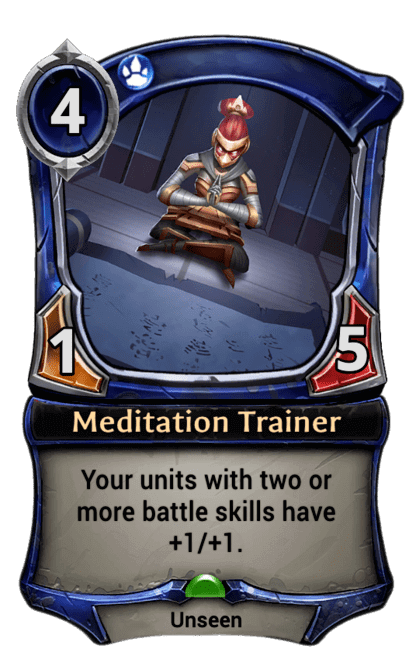
Beyond the core game mechanics common to Eternal and Magic (drawing once per turn; playing 1 power/land per turn; casting spells for power/mana; a single attack step; power, toughness, and damage; etc), the game has a number of named mechanics called keywords, some of which are further classified as skills and battle skills. Skills are keyword nouns in the sense that all other keywords are keyword actions. Battle skills are skills that go on units and weapons that directly affect combat. This classification is relevant because there are cards that look for battle skills.
There are ten battle skills that line up 1:1 with creature mechanics from Magic: Flying, Overwhelm (trample), Charge (haste), Deadly (deathtouch), Lifesteal (lifelink), Ambush (flash), Reckless (must attack), Unblockable (can't be blocked), Double Damage (double strike, except all at normal speed), Endurance (vigilance, plus immunity to tap effects), and Quickdraw (First strike, but only offense).
There are a handful of trigger keywords that replace trigger text common to Magic: Summon (when ~ etb), Entomb (when ~ dies), Empower (landfall), Lifeforce (whenever you gain life), Spark (bloodthirst), and Tribute (morbid). Other trigger keywords include Ally (which triggers once when you control another unit of the specified type [and never turns off]), Fate (when ~ is drawn), Infiltrate (saboteur, but only once), Ultimate (a triggered or activated ability that can only occur once), Transmute 5 (when you have 5+ mana, transform this land to its spell face), and Mentor/Student (when ~ etb, you may tap another creature, if you do, effect [usually enhancing the student]).
 Eternal does a great job taking advantage of the digital format via mechanics that could not be implemented in a meatspace CCG without having a GM present or modifying cards. The most fundamental is that modifications to a card's stats persist across zones. The first time Worldpyre Phoenix dies, it returns to your hand from void (graveyard) as an 8/8 for 9. The second time, it returns as an 11/11 for 12. The game never forgets a card's altered stats, no matter what zone it goes to. It's pretty tame compared to that, but Eternal doesn't need counters to modify a creature's stats. It can grant +3/+3 until EOT, but it can also just grant +3/+3, straight up. This change becomes so true of the card, that if you copy it, the copy will reflect the new stats.
Eternal does a great job taking advantage of the digital format via mechanics that could not be implemented in a meatspace CCG without having a GM present or modifying cards. The most fundamental is that modifications to a card's stats persist across zones. The first time Worldpyre Phoenix dies, it returns to your hand from void (graveyard) as an 8/8 for 9. The second time, it returns as an 11/11 for 12. The game never forgets a card's altered stats, no matter what zone it goes to. It's pretty tame compared to that, but Eternal doesn't need counters to modify a creature's stats. It can grant +3/+3 until EOT, but it can also just grant +3/+3, straight up. This change becomes so true of the card, that if you copy it, the copy will reflect the new stats.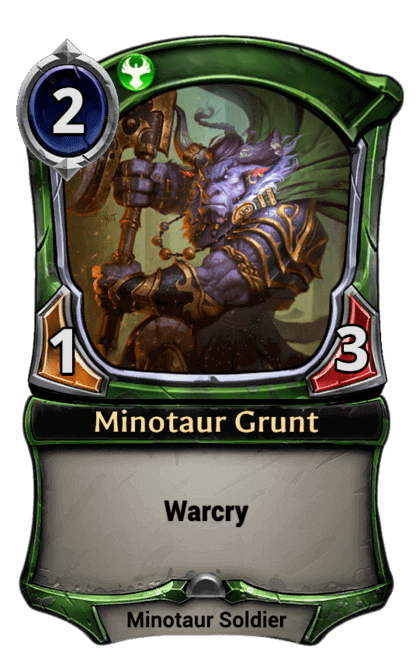 Warcry is one this game's best mechanics. Whenever a creature with warcry attacks, it grants a permanent +1/+1 to the top unit or weapon of your deck. First, that's a fun reward for attacking. Second, it's awesome that the game can look in your deck and find the next threat in it, no matter how far down it is or isn't. You're guaranteed to receive the value warcry promises, but it might be on the next card you draw, or a card ten down, depending purely on your shuffle. What a great piece of tension. The reward is coming, but when? The longer you have to wait, the more warcry triggers pile up on the same card, and the bigger it'll be when you finally draw and play it. There are cards designed specifically to reward being enhanced by warcry (or weapons, etc).
Warcry is one this game's best mechanics. Whenever a creature with warcry attacks, it grants a permanent +1/+1 to the top unit or weapon of your deck. First, that's a fun reward for attacking. Second, it's awesome that the game can look in your deck and find the next threat in it, no matter how far down it is or isn't. You're guaranteed to receive the value warcry promises, but it might be on the next card you draw, or a card ten down, depending purely on your shuffle. What a great piece of tension. The reward is coming, but when? The longer you have to wait, the more warcry triggers pile up on the same card, and the bigger it'll be when you finally draw and play it. There are cards designed specifically to reward being enhanced by warcry (or weapons, etc). Just to really hammer home the point; here's how this card might look in Magic. Notice that it's a bunch more text, without the full functionality, and it's doing a number of things black border Magic really can't support.
Just to really hammer home the point; here's how this card might look in Magic. Notice that it's a bunch more text, without the full functionality, and it's doing a number of things black border Magic really can't support.Silence is a significant mechanic in Eternal. When you silence a unit, you remove all text and abilities from the card, leaving its stats wherever they were. That does nothing to a Sand Wurm, but everything to a Bridled Sandstrider. It upgrades Urska, the Bear! And again, this effect persists across all zones. Ayan, the Ambusher can reanimate any unit, but without text. Steward of the Past can turn off The Tormentor while it's dead (and even it's Dark Returned).
Personally, I find silence frustrating. It's very much a NO mechanic, which is something Eternal otherwise does a good job of limiting (there's not much discard, less countermagic, and no land destruction). Yes, you get to keep the body of your silenced unit, but these games are all about combos and synergies and silence destroys those too efficiently.
 The last fundamental Eternal mechanic that really showcases the digital format is create. At first blush, it works just like in Magic: You get to create a token creature or two. But Eternal doesn't create tokens, it creates cards. And cards can exist in more places than just in play. "How can Wurmcalling make two 7/7s," you ask? Because it's not putting them into play, it's putting them in your hand. You still have to cast them.
The last fundamental Eternal mechanic that really showcases the digital format is create. At first blush, it works just like in Magic: You get to create a token creature or two. But Eternal doesn't create tokens, it creates cards. And cards can exist in more places than just in play. "How can Wurmcalling make two 7/7s," you ask? Because it's not putting them into play, it's putting them in your hand. You still have to cast them.Eternal isn't limited to just making unit cards either: It can make weapons, relic weapons, and even spells. Or just a random card. Speaking of random, another persistent change you can make to a card is to transform it into another (at random or otherwise). You can also sabotage your opponent's deck with Firebombs.
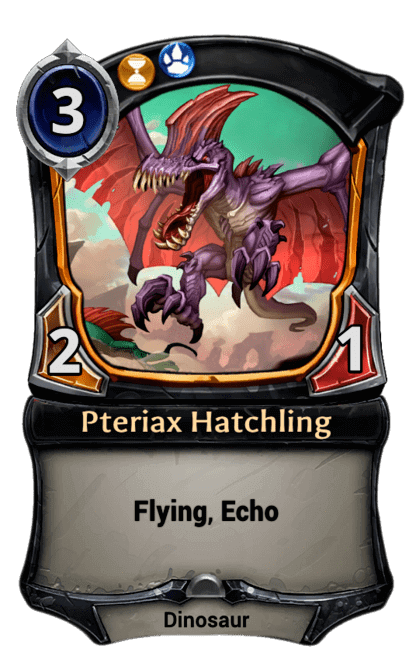 Echo is another really great Eternal keyword that involves creating new cards. When you draw one card with Echo, you get two instead. Card advantage is always nice, but the game quickly demonstrates how you can use cards like Second Sight to get even more. I remember when I first read Nesting Avisaur and wondered why I'd ever plan to lose card advantage in order to cast a card. Turns out casting a 2/1 flyer for 1 is pretty good. I should say, casting two of them for 1 each. Add Meditation to improve your echo cards in the physical dimension. And keep in mind that you draw your echo copies, so all of these shenanigans make your Psionic Savant very happy.
Echo is another really great Eternal keyword that involves creating new cards. When you draw one card with Echo, you get two instead. Card advantage is always nice, but the game quickly demonstrates how you can use cards like Second Sight to get even more. I remember when I first read Nesting Avisaur and wondered why I'd ever plan to lose card advantage in order to cast a card. Turns out casting a 2/1 flyer for 1 is pretty good. I should say, casting two of them for 1 each. Add Meditation to improve your echo cards in the physical dimension. And keep in mind that you draw your echo copies, so all of these shenanigans make your Psionic Savant very happy.I'm not going to review every Eternal keyword today. Aegis is a nice ablative alternative to hexproof. Stun (detain), Spellcraft (kicker for weapons), Warp (play from top of deck), Inspire (affects units you draw), Revenge/Destiny (shuffle into your deck after death / play for free when drawn and draw again), Berserk (can attack twice one time, and then gains reckless), Bond (tribal convoke), Scout (scry 1) are also relevant. Nightfall is worth mentioning briefly: When a card causes nightfall, it is night until the end of your next turn. Players draw an extra card and lose 1 health during the night, and a number of cards are better or worse during night. Except for bond and scout, all of these are made much more feasible by the easy with which the digital format tracks and displays state changes.
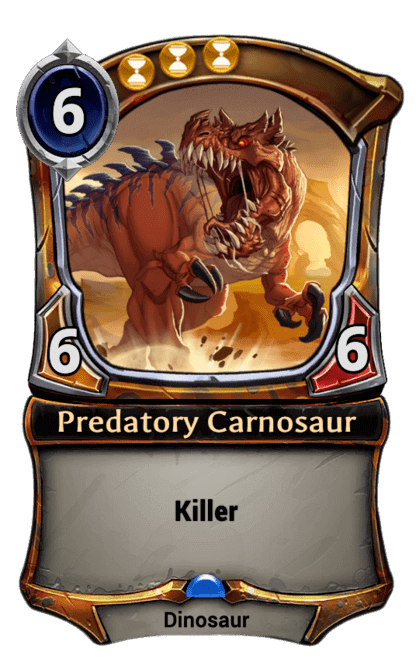 The last keyword I have to mention is Killer because it works like Relic Weapons do, in terms of fighting outside combat. I haven't mentioned this yet, so let me back up. Just like in Magic, you get one combat phase, and you can attack with any number of ready units at once; they just attack your opponent, and your opponent can block them as they please. There is something analogous to Magic's fight keyword that allows units to attack outside of combat and to target specific units. Where fight is an action keyword that generally happens immediately, killer is a battle skill that remains until used. Units can't attack normally the turn they're played unless they have charge, but a unit with killer can make it's killing attack as if it had charge. It must attack a unit, if the opponent has any. Otherwise, it can attack the opponent. A killing attack can't be blocked. There's one exception and that's ambush; a unit with ambush can be played in response to a killing attack and intercept that attack. Note that only one unit can ambush that attack, so playing a second ambush unit will just steal the interception from the first.
The last keyword I have to mention is Killer because it works like Relic Weapons do, in terms of fighting outside combat. I haven't mentioned this yet, so let me back up. Just like in Magic, you get one combat phase, and you can attack with any number of ready units at once; they just attack your opponent, and your opponent can block them as they please. There is something analogous to Magic's fight keyword that allows units to attack outside of combat and to target specific units. Where fight is an action keyword that generally happens immediately, killer is a battle skill that remains until used. Units can't attack normally the turn they're played unless they have charge, but a unit with killer can make it's killing attack as if it had charge. It must attack a unit, if the opponent has any. Otherwise, it can attack the opponent. A killing attack can't be blocked. There's one exception and that's ambush; a unit with ambush can be played in response to a killing attack and intercept that attack. Note that only one unit can ambush that attack, so playing a second ambush unit will just steal the interception from the first.All of this is true of the attack you make with a relic weapon too. Relic Weapons are a bit unintuitive in other ways too. You can only have one at a time; playing a second kills the first and resets your power and shields (even though other cards can increase them). You can only attack with a relic weapon once per turn, no matter how many you play. Any keywords your relic weapon has, spells you cast also get (so if you have Stonescar Maul, your Torches will have overwhelm too). Relic Weapons are unlike planeswalkers in some significant ways, but they do fill the experiential role of reminding the player their character is part of the action.
I'm quite fond of most of Eternal's mechanics. 9 out of 10 times, it feels like the answer to the question "What would Magic be like if we recreated it with today's knowledge, for a digital platform," which I guarantee was Dire Wolf's guiding vision behind the game. There are some nice refinements, like Quickdraw only being first strike on offense. There are a few weaker calls too, like printing both double damage and berserk; they fill the same role but one is much more complicated than the other. Overall, it's a very well designed game.
There is a fan-powered Wiki, which is pretty good, if you want to find more details.
Part I - Part II - Part III - Part IV

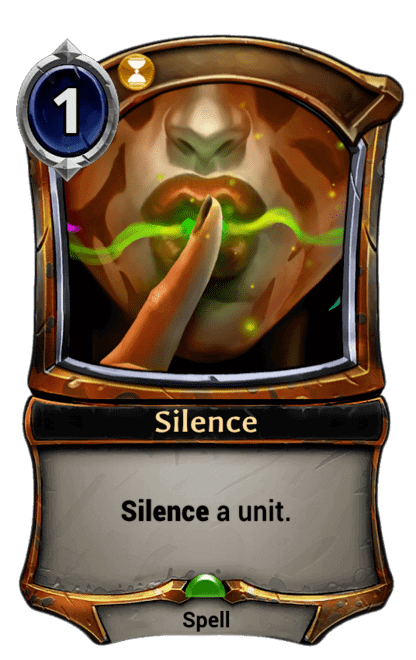
The reliance on keywords is a bit surprising. I mean, for a two year old game, there are a LOT of keywords. Some even have nested information like Create. While I appreciate the space saving, it really makes me appreciate the clarity of activated abilities in Magic. Compare MTG's Titan Forge to Eternal's Wurmcalling. Eternal assumes a lot of a player, particularly of an opponent who doesn't get to see the cards that are created. It's an interesting design choice, but something that it will be interesting to watch as the game tries to keep going.
ReplyDeleteThe amount of obscured information is considerable. In some places, it's a clear win—like keywording Summon. In others, it seems expensive, like creating cards that you don't necessarily know what do. It's highly plausible that there will come a point when there are too many keywords and new players I turned off; I believe Eternal will need a curated Constructed environment like Standard sooner rather than later.
DeleteIt depends on their growth model, many online CCGs just rely on Ranked constructed pairing to help ensure that new players don't get paired against established players with new decks. Both models have advantages: curated constructed hurts established players who have larger collections or risks fracturing the constructed player base between Vintage and Standard players. Ranked constructed can hurt new player acquisition as the lag to find an appropriate player increases as new player enrollment slows.
DeleteCan you explain what Echo does?
ReplyDeleteMy mistake. Editing the post.
DeleteWhen you draw a card with Echo, you draw a second copy of it.
One choice that Eternal made that I was originally unsure about but have come around to really liking is that Eternal keeps making new cards with keywords from previous sets. For example, Warp, introduced in Set 2, has a large number of interesting cards in Set 4. Warcry, introduced in Set 1, continues to appear.
ReplyDeleteOriginally, mechanics seem to appear in two colors, but then when they appear in future sets, they spread out. Infiltrate now seems to appear in every color (except maybe Justice?) now.
I originally worried the huge abundance of keywords would be a complexity issue, but since you can easily mouseover every keyword it is not a problem, and makes the textboxes of cards mostly very concise, which is very important for a digital game, especially one that is meant to be played on mobile.
If I were to name what I think is the biggest "leak" that DWD has in Eternal card designs, it is that they often put out a number of uncommons/rares with huge complicated textboxes for little to no gain. Since textboxes are invisible in game, 99.9% of cards need to meet the bar of "Once I've read it once, I know what it does." You get 0.1% for cards that do really exciting things in constructed and become an iconic part of the game. Random uncommons like Herald of the Parliment (to name one example from the recent set) are just not the place.
There are too many texty boxes, agreed.
DeleteI appreciate the perspective on how mechanics are returning in subsequent sets.
I think one of the really fun things with Eternal WRT Magic design is thinking about how to translate the digital mechanics to a paper card game. So many of the mechanics are really close with just a bit more memory involved than Magic would normally do. Magic seems to be moving towards more memory intensive mechanics anyway, like Exert, Sagas and Embalm, so this is ripe ground.
ReplyDeleteSounds like a WAC.
DeleteJay, I'd be really interested to read your take on the design of Warp. I have a love-hate relationship with the mechanic -- it creates really intense emotional responses, where I get a little jolt of adrenaline every time I see a Warp card on top of my deck. I view that as a huge plus, but a huge percentage of the time, that jolt is followed up with a feeling of disappointment because I can't cast the card -- and to add insult to injury, now I know I'm drawing a blank next turn.
ReplyDeleteWhat have your experiences with Warp been? Would you make any adjustments to it?
I'm not Jay but I'm a huge Warp lover, and it interacts with a lot of little things in the game that aren't immediately clear.
DeleteFor example, see a warp card on top of your deck that you don't like? Sounds like a good turn to use your Scryland doesn't it?
There are also fun decisions with Warcry and Warp. Do I want the Warcry to go to the top unit? or is that unit good enough, and I want to cast it before combat so the next one gets buffed?
It does feel bad to have Warp cards in your opening hand though.
Warp is problematic. Sometimes it's a free card, and sometimes it feels really bad. When you start the game with a warp card in your hand, it's a missed opportunity but not too hard to shrug off. When you see a warp card you'd love to cast on top of your deck, but you don't have enough to cast it, that's frustrating. When you draw a card during your turn and then see a warp card on top but no longer have enough mana to play it, that sucks. And when you don't notice a warp card you could've cast on top of your deck until it's too late, you feel like an idiot.
DeleteThat's a lot of ways for a mechanic to feel bad, and none of them are exceptional in frequency.
That said, the mechanic is not without its charm, as Tommy mentions.
Warp generally increases the cost of a card by 1, which—if a card is worth 2 like it is in Magic—seems fair. The trouble is that makes it all the more unlikely you can cast it when you see it.
It doesn't help to push the extra cost to when it's in your hand, because that makes failing to warp feel even worse. I think what it needs is some other cost—preferably an opportunity cost, but discarding a card from your hand would sure be fair.
Insightful post, really enjoyed the perspective shared here. At Kwik Kar Auto Dallas, we often help drivers understand how much to fix AC in car issues before they turn into bigger problems. Knowing how much to fix AC in car helps vehicle owners plan proper Car Maintenance and avoid sudden breakdowns. Our Auto Repair Shop provides trusted Auto Care, complete Car Repair Services, and reliable Automotive Repair Services for long-term comfort and performance. If you’re researching how much to fix ac in car, working with a professional Vehicle Repair Shop and experienced Car Repair Workshop ensures quality Vehicle Repair and dependable Car Repair and maintenance results.
ReplyDelete